T-Bills: Government Sees 55% Oversubscription as Interest Rates Surge

Treasury Bill- Meaning, Features, Benefits and More
Demand for Treasury bills (T-bills) has surged dramatically on the money market, with the government experiencing a 55% oversubscription during its recent T-bill auction. While the increase in demand is seen as a positive sign, it has come at the cost of significantly higher interest rates, raising concerns about the growing expenses associated with servicing the nation’s short-term debt.
According to the latest results released by the Bank of Ghana, the government raised a substantial GH¢8.075 billion from the sale of T-bills, far exceeding its original target of GH¢5.198 billion, which was set to refinance maturing bills. This remarkable oversubscription indicates strong investor interest in these short-term government securities. Despite the oversubscription, the government accepted all the bids submitted, showcasing its ability to raise the needed funds but also increasing the overall cost of financing.
The breakdown of the auction results revealed that the largest share of the funds raised came from the 91-day T-bills. A total of GH¢5.513 billion was raised from these bills, which accounted for 68.27% of the total bids. This reflects the high demand for short-term debt instruments, likely driven by investor confidence in the government’s ability to meet its obligations. The 182-day T-bills saw GH¢1.416 billion in bids, while the 364-day bills raised GH¢1.145 billion.
However, the surge in demand has been accompanied by a significant increase in interest rates, which has raised alarms about the growing cost of servicing domestic debt. The yield on the 91-day bills, for instance, rose by 14 basis points to 28.33%. This sharp increase in interest rates has further strained the government’s finances, as higher yields translate to greater debt-servicing costs. Similarly, the yield on the 182-day bills climbed to 28.96% from 28.91% in the previous week, while the yield on the 364-day bills increased by 2 basis points to 30.17%.
The rising interest rates are indicative of the market’s increasing risk perception regarding government debt. Investors typically demand higher returns when they perceive a higher risk of default or when inflation and economic instability are significant concerns. As interest rates rise, the government faces a higher burden in repaying these bills, which could eventually lead to higher public debt and increased fiscal pressure.
While the strong demand for T-bills suggests that investors are still willing to lend to the government, the increasing yields signal a growing cost for the government in the form of higher interest payments. This situation raises important questions about the sustainability of the country’s domestic debt and the long-term implications for public finances. As the government continues to rely on short-term borrowing to meet its fiscal needs, the rising interest rates may put additional strain on an already tight budget.
Moreover, the surge in interest rates could lead to broader economic consequences. Higher yields on government debt may crowd out private investment, as businesses may face higher borrowing costs due to the increased demand for government securities. This could slow down economic growth and exacerbate the challenges facing businesses, especially small and medium-sized enterprises (SMEs).
The government is likely to face increasing pressure to address these rising costs and explore alternative financing mechanisms to reduce reliance on short-term debt. One potential solution could involve lengthening the maturity of government bonds to lock in lower interest rates over a longer period, though this may come with its own set of challenges.
While the oversubscription of the recent T-bill auction highlights strong investor interest in government securities, the rising interest rates associated with this demand are raising concerns about the growing cost of servicing Ghana’s domestic debt. As the government continues to rely on T-bills to raise funds, it must carefully manage its borrowing strategy to ensure that the cost of debt remains sustainable in the long run. The increasing interest rates underscore the need for fiscal prudence and a comprehensive approach to managing public debt, which will be essential for maintaining economic stability and ensuring the government can meet its financial obligations without further escalating the cost of borrowing.







